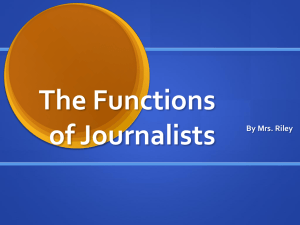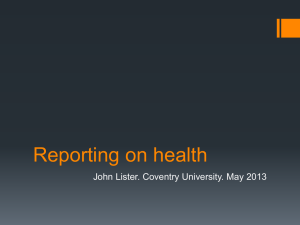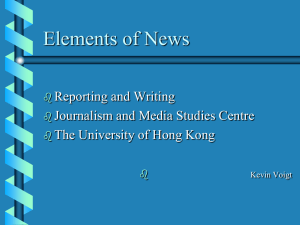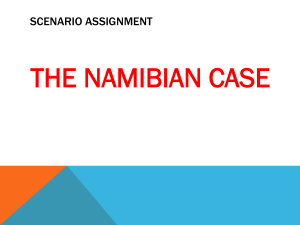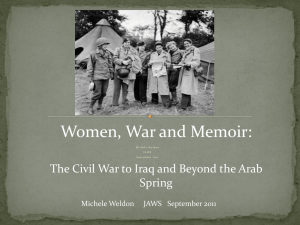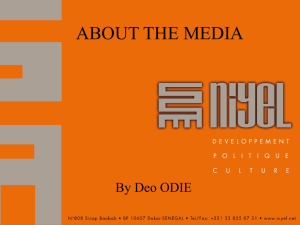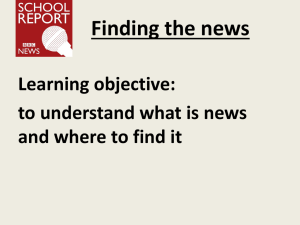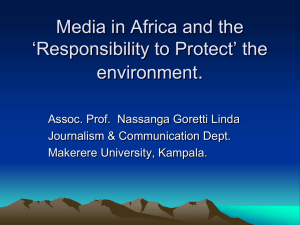Please, click to - The Nigerian Press Council
advertisement
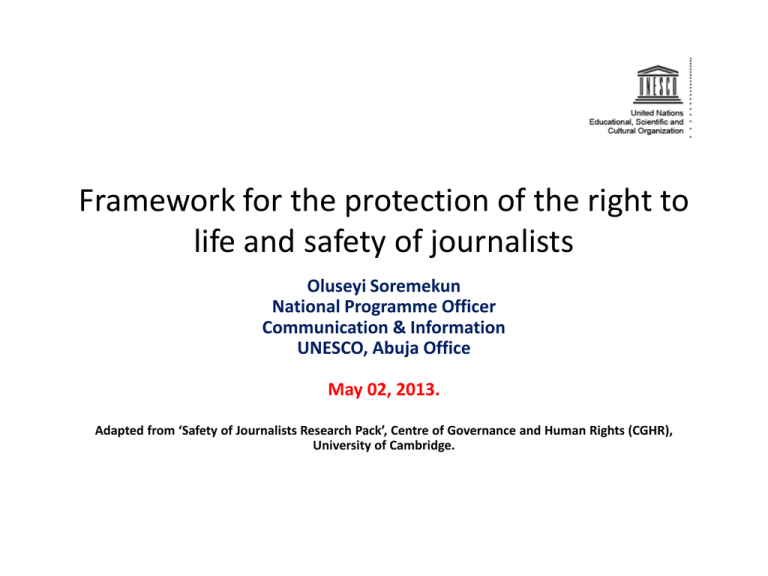
Framework for the protection of the right to life and safety of journalists Oluseyi Soremekun National Programme Officer Communication & Information UNESCO, Abuja Office May 02, 2013. Adapted from ‘Safety of Journalists Research Pack’, Centre of Governance and Human Rights (CGHR), University of Cambridge. Outline • • • • Defining a journalist International Framework for protection Regional framework for protection National legal framework for protection Who is a ‘journalist’? • It’s important to define the term ‘journalist’ to be able to determine the applicable legal framework and States’ obligations towards journalists. • New forms of electronic media make mass communication available to nonprofessionals, the understanding of what is meant by ‘journalism’ has expanded to include citizen reporters as well as more traditional print publishers • Definitions Recommendation 4 of 3 May 1996 of the Committee of Ministers of the Council of Europe used the term journalist to cover: “all representatives of the media, namely all those engaged in the collection, processing and dissemination of news and information including cameramen and photographers, as well as support staff such as drivers and interpreters”. Who is a ‘journalist’? • Human Rights Committee 2011 General Comment No. 34 on article 19, paragraph 44 defines journalism as “a function shared by a wide range of actors, including professional full time reporters and analysts, as well as bloggers and others who engage in forms of self-publication in print, on the internet or elsewhere”. • The 2010 Annual Report of the Special Rapporteur on the right to freedom of expression (11 August 2010, A/65/284) defined journalists as “individuals who are dedicated to investigating, analysing and disseminating information, in a regular and specialised manner, through any type of written media, broadcast media, (television or radio) or electronic media. With the advent of new forms of communication, journalism has extended into new areas, including citizen journalism.” International Human Rights Law(IHRL) At the international level • • • Rights that concern protection of right to life of journalists: right to personal liberty and integrity, freedom from torture, freedom of expression, right to an effective remedy. International human rights law instruments guarantee all these rights and impose obligations on states to uphold these Cases of violence against journalists range from harassment, hindrance to perform their professional roles, physical and verbal assaults to deprivation of their right to life. • • No specific international legal instrument that deals exclusively with protecting the personal security of journalists Nonetheless, provisions protecting the right to life, personal liberty and integrity, freedom from torture, freedom of expression, and the right to an effective remedy (already in international human rights law instruments) provide journalists with the necessary guarantees against violations of their rights and risks to their safety. IHRL Contd.:The Universal Declaration of Human Rights (UDHR) and The International Covenant on Civil & Political Rights (ICCPR) • The UDHR secures the “right to life, liberty and security of person” (Article 3), the right not to be subjected to “torture or to cruel, inhuman or degrading treatment or punishment” (Article 5) or arbitrary arrest (Article 9), and the right to an effective remedy for violations of one’s rights (Article 8). The International Covenant on Civil & Political Rights (ICCPR) • The ICCPR gives the right to effective remedy (Article 3), the right to life (Article 6), prohibition of torture or to cruel, inhuman or degrading treatment or punishment (Article 7), right to liberty and security of the person (Article 9), and freedom of expression (Article 19). IHRL Contd.: At the Regional Level • In fulfilling their obligations to refrain from deliberately interfering with the right to life of journalists, States are entitled to respect their obligations under the UN Convention against Torture and Other Cruel, Inhuman or Degrading Treatment or Punishment and the International Convention for the Protection of All Persons from Enforced Disappearance. The African Charter on Human and People’s Rights guarantees individuals against arbitrary deprivation of the right to life (Article 4), establishes an absolute prohibition of torture and other inhuman or degrading treatment (Article 5), guarantees the right to liberty and security of the person (Article 6), and freedom of expression (Article 9). Other regional instruments include, The European Convention on Human Rights; The American Convention of Human Rights; and The Arab Charter on Human Rights • The international legal framework seems comprehensive in scope. National Legal Framework (The Nigerian Constitution) • The 1999 Constitution of the Federal Republic of Nigeria provides some protections: • Chapter II (Fundamental objectives and directive principles of state policy), section 14 (2b) declares that the security and welfare of the people shall be the primary purpose of the government • Section 17 (2b) stipulates that the sanctity of the human person shall be recognised and human dignity shall be maintained and enhanced • Section 17 (3c) stipulates that the health, safety and welfare of all persons in employment are safeguarded and not endangered or abused National Legal Framework (The Nigerian Constitution) contd. • Chapter IV (Fundamental Rights) of the Nigerian constitution seems comprehensive: • Section 33 (1) says every person has a right to life, and no one shall be deprived intentionally of his life... • Section 34 (1) stipulates that every individual is entitled to respect for the dignity of his person, and accordingly (a) no person shall be subject to torture or to inhuman or degrading treatment... • Section 35 (1) says that every person shall be entitled to his personal liberty and no one shall be deprived of such liberty National Legal Framework (The Nigerian Constitution) contd. • Specifically, section 38 (1) of the same constitution provides ‘that every person shall be entitled to freedom of expression including freedom to hold opinion and to receive and impart ideas and information without interference.’ • Section 22 stipulates that the press, radio, television and other agencies of the mass media shall at all times be free to uphold the fundamental objectives contained in this chapter and uphold the responsibility and accountability of the government to the people. Attempts by journalists to work within the framework of this provision sometimes led to their attacks. • Nigeria has a comprehensive legal framework that protects journalists and guarantees freedom of the press National Legal Framework (The Freedom of Information Act, 2011) • FOI Act makes public records and information more freely available, provide for public access to public records and information, protect public records and information to the extent consistent with the public interest and the protection of personal privacy, protect serving public officers from adverse consequences for disclosing certain kinds of official information without authorisation and established procedures for the achievement of those purposes • Section 1: Right of access to records the right of any person to access or request information...which is in the custody of any public official, agency...is established No need to demonstrate specific interest in the information being applied for Right to institute proceedings in the Court to compel compliance Conclusion • Major obstacle facing the protection of the right to life of journalists is not the insufficiency of the scope of existing rights but rather from implementation or enforcement gaps. • All journalists in principle benefit from the right to life, and the prohibition against forced disappearance and torture. The right to life and freedom of expression include positive duties such as the duty to investigate and prosecute perpetrators after a journalist is killed. • The nature of their profession itself makes journalists subject to heightened risks and targeting more than others who exercise the right of freedom of expression and opinion. This can suggest that journalists be regarded as a vulnerable category of individuals • The fundamental role played by journalists in the functioning of societies which make them deserve special protection since violations to their rights also entail violations of others’ rights to access knowledge. Conclusion • Implementation of existing laws remains difficult. According to a Committee to Protect Journalists (CPJ) report, more than 94% of the attacks on journalists are not investigated at all. (Iraq and Somalia rank first and second). • The society should see journalism as another profession in support of good governance as entrenched in section 22 of the 1999 Constitution • Agents of the state should see journalists as partners in the development of the country • Journalists should uphold the dignity of the profession always • Journalists should uphold ethics and ethos of the profession always as a failure to do so could lead to attacks and even death THANK YOU

